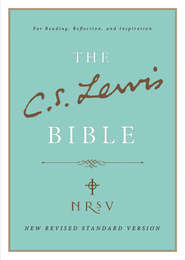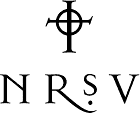
Полная версия:
C. S. Lewis Bible: New Revised Standard Version

THE
C. S. Lewis
BIBLE

NEW REVISED STANDARD VERSION

CONTENTS
Cover
Title Page
Notes and Introductions
Alphabetical List of the Books of the Bible
Abbreviations
Editors and Advisory Board
Preface: Why a C. S. Lewis Bible?, by Douglas Gresham
Introduction: C. S. Lewis and the Bible, by Jerry Root
C. S. Lewis as a Guide for Bible Reading
How to Read The C. S. Lewis Bible
The Spiritual Journey of C. S. Lewis, by Jerry Root
Editor’s Note
To the Reader
OLD TESTAMENT
Genesis
Exodus
Leviticus
Numbers
Deuteronomy
Joshua
Judges
Ruth
1 Samuel
2 Samuel
1 Kings
2 Kings
1 Chronicles
2 Chronicles
Ezra
Nehemiah
Esther
Job
Psalms
Proverbs
Ecclesiastes
Song of Solomon
Isaiah
Jeremiah
Lamentations
Ezekiel
Daniel
Hosea
Joel
Amos
Obadiah
Jonah
Micah
Nahum
Habakkuk
Zephaniah
Haggai
Zechariah
Malachi
NEW TESTAMENT
Matthew
Mark
Luke
John
Acts
Romans
1 Corinthians
2 Corinthians
Galatians
Ephesians
Philippians
Colossians
1 Thessalonians
2 Thessalonians
1 Timothy
2 Timothy
Titus
Philemon
Hebrews
James
1 Peter
2 Peter
1 John
2 John
3 John
Jude
Revelation
Afterword and Indexes
Afterword: Reflections on Scripture, by C. S. Lewis
Indexes
Index by Source
Index by Scripture Reference
Concordance
About the Author
Copyright
About the Publisher
Notes and Introductions
Alphabetical List of the Books of the Bible
Abbreviations
Editors and Advisory Board
Preface: Why a C. S. Lewis Bible?, by Douglas Gresham
Introduction: C. S. Lewis and the Bible, by Jerry Root
C. S. Lewis as a Guide for Bible Reading
How to Read The C. S. Lewis Bible
The Spiritual Journey of C. S. Lewis, by Jerry Root
Editor’s Note
To the Reader
ALPHABETICAL LIST
OF THE BOOKS OF THE BIBLE
Acts
Amos
1 Chronicles
2 Chronicles
Colossians
1 Corinthians
2 Corinthians
Daniel
Deuteronomy
Ecclesiastes
Ephesians
Esther
Exodus
Ezekiel
Ezra
Galatians
Genesis
Habakkuk
Haggai
Hebrews
Hosea
Isaiah
James
Jeremiah
Job
Joel
John
1 John
2 John
3 John
Jonah
Joshua
Jude
Judges
1 Kings
2 Kings
Lamentations
Leviticus
Luke
Malachi
Mark
Matthew
Micah
Nahum
Nehemiah
Numbers
Obadiah
1 Peter
2 Peter
Philemon
Philippians
Proverbs
Psalms
Revelation
Romans
Ruth
1 Samuel
2 Samuel
Song of Solomon
1 Thessalonians
2 Thessalonians
1 Timothy
2 Timothy
Titus
Zechariah
Zephaniah
ABBREVIATIONS
The following abbreviations are used for the books of the Bible:
OLD TESTAMENT
Gen Genesis Ex Exodus Lev Leviticus Num Numbers Deut Deuteronomy Josh Joshua Judg Judges Ruth Ruth 1 Sam 1 Samuel 2 Sam 2 Samuel 1 Kings 1 Kings 2 Kings 2 Kings 1 Chr 1 Chronicles 2 Chr 2 Chronicles Ezra Ezra Neh Nehemiah Esth Esther Job Job Ps(s) Psalms Prov Proverbs Eccl Ecclesiastes Song Song of Solomon Isa Isaiah Jer Jeremiah Lam Lamentations Ezek Ezekiel Dan Daniel Hos Hosea Joel Joel Am Amos Ob Obadiah Jon Jonah Mic Micah Nah Nahum Hab Habakkuk Zeph Zephaniah Hag Haggai Zech Zechariah Mal MalachiNEW TESTAMENT
Mt Matthew Mk Mark Lk Luke Jn John Acts Acts of the Apostles Rom Romans 1 Cor 1 Corinthians 2 Cor 2 Corinthians Gal Galatians Eph Ephesians Phil Philippians Col Colossians 1 Thess 1 Thessalonians 2 Thess 2 Thessalonians 1 Tim 1 Timothy 2 Tim 2 Timothy Titus Titus Philem Philemon Heb Hebrews Jas James 1 Pet 1 Peter 2 Pet 2 Peter 1 Jn 1 John 2 Jn 2 John 3 Jn 3 John Jude Jude Rev RevelationIn the notes to the books of the Old Testament, the following abbreviations are used:
Ant. Josephus, Antiquities of the Jews Aram Aramaic Ch(s) Chapter(s) Cn Correction; made where the text has suffered in transmission and the versions provide no satisfactory restoration, but where the Standard Bible Committee agrees with the judgment of competent scholars as to the most probable reconstruction of the original text. Gk Septuagint; Greek version of the Old Testament Heb Hebrew of the consonantal Masoretic Text of the Old Testament Josephus Flavius Josephus (Jewish historian, about A.D. 37 to about 95) Macc. The book(s) of the Maccabees Ms(s) Manuscript(s) MT The Hebrew of the pointed Masoretic text of the Old Testament OL Old Latin Q Ms(s) Manuscript(s) found at Qumran by the Dead Sea Sam Samaritan Hebrew text of the Old Testament Syr Syriac Version of the Old Testament Syr H Syriac Version of Origen’s Hexapla Tg Targum Vg Vulgate; Latin Version of the Old TestamentEDITORS AND ADVISORY BOARD
Project Editors
Marlene Baer Hekkert and Michael G. Maudlin
Managing Editor
Patricia Klein
Consulting Editors
Douglas Gresham and Jerry Root
Production Editor
Suzanne Quist
ADVISORY BOARD
Gayne Anacker is vice president of the C. S. Lewis Foundation and professor of philosophy at California Baptist University.
Sarah Arthur is a founding board member of the award-winning Michigan C. S. Lewis Festival and the author of numerous youth resources on C. S. Lewis, including Walking through the Wardrobe.
Devin Brown is a Lilly Scholar and a professor of English at Asbury University, where he teaches a class on C. S. Lewis. He is the author of Inside Narnia, Inside Prince Caspian, and Inside the Voyage of the Dawn Treader.
Michael J. Christensen is director of the Shalom Initiative for Prophetic Leadership and Community Development and affiliate associate professor of spirituality and religious studies at Drew University. He is also an ordained United Methodist minister and the author of C. S. Lewis on Scripture.
Fr. Andrew Cuneo is a priest in the Orthodox Church and has taught English literature at Hillsdale College. He obtained his M.Phil. and D.Phil. in English from Merton College at the University of Oxford.
Lyle Dorsett is the Billy Graham Professor of Evangelism at Beeson Divinity School and was the former head of the Marion E. Wade Center at Wheaton College. He is also the author of And God Came In: The Extraordinary Story of Joy Davidman and Seeking the Secret Place: The Spiritual Formation of C. S. Lewis.
Colin Duriez has written several books on C. S. Lewis and the Inklings, including The C. S. Lewis Encyclopedia, The Inklings Handbook (with the late David Porter), J. R. R. Tolkien and C. S. Lewis: The Gift of Friendship, and A Field Guide to Narnia. He has also appeared as a commentator on C. S. Lewis on DVD and on television, including productions for the BBC and PBS.
Bruce L. Edwards is professor of English and Africana studies at Bowling Green State University (Ohio) and has served as a C. S. Lewis Foundation Fellow at the Kilns in Oxford, England. He is also the editor of C. S. Lewis: Life, Works, and Legacy.
Paul Ford is a professor of systematic theology and liturgy at St. John’s Seminary, is an internationally recognized authority on the life and writings of C. S. Lewis, and is the award-winning author of Companion to Narnia and editor of Words to Live By: A Dictionary for the Mere Christian and Yours, Jack: Spiritual Direction from C. S. Lewis.
Garry Friesen is a professor of Bible at Multnomah Bible College, where he teaches a course on C. S. Lewis. His Ph.D. is from Dallas Seminary, where he did a master’s thesis on Lewis’s view of Scripture. Garry mentors six college students at his house, which has a Narnia theme that brings hundreds every year for a tour. He is an elder at Imago Dei Community and has just finished twenty years’ work on a C. S. Lewis Scripture index with ten thousand entries.
Walter Hooper is a trustee and literary adviser of the estate of C. S. Lewis. In 1963 he served briefly as Lewis’s private secretary, and after Lewis’s death he devoted himself to Lewis’s memory, eventually taking up residence in Oxford, England, where he now lives.
Reed Jolley is a pastor at Santa Barbara Community Church and contributor to C. S. Lewis: Lightbearer in the Shadowlands.
Don King is professor of English at Montreat College, editor of the Christian Scholar’s Review, and the author of three books, including C. S. Lewis, Poet: The Legacy of His Poetic Impulse.
Art Lindsley is a senior fellow at the C. S. Lewis Institute and is the author of C. S. Lewis’s Case for Christ.
Marjorie Lamp Mead is associate director of the Marion E. Wade Center, Wheaton College (Illinois). She is coeditor of Brothers and Friends: The Diaries of Major Warren Hamilton Lewis and C. S. Lewis: Letters to Children, as well as coauthor of A Reader’s Guide Through the Wardrobe and A Reader’s Guide to Caspian.
Earl Palmer was the former senior pastor of University Presbyterian Church and is a speaker at the C. S. Lewis Institute.
Jerry Root wrote both his M.A. thesis and Ph.D. dissertation on C. S. Lewis. He has been teaching college and graduate courses on C. S. Lewis for over thirty years. He currently teaches at Wheaton College (Illinois) and is a visiting professor at Biola University and Talbot Graduate School of Theology. He is the author of C. S. Lewis and a Problem of Evil and coeditor of The Quotable Lewis.
Revd. Dr. Jeanette Sears was formerly the president of the Oxford C. S. Lewis Society and is currently a tutor in doctrine and church history at Trinity College, Bristol, England. She has a Ph.D. in theology (Manchester), was a Kennedy Scholar at Harvard, and is an Anglican priest, novelist, and author of The Oxford of J. R. R Tolkien and C. S. Lewis.
Dick Staub is an award-winning broadcaster, writer, and speaker whose work focuses on understanding faith and culture and interpreting each to the other. The Kindlings organization he oversees (www.TheKindlings.com) is inspired by the intellectual, creative, and spiritual legacy of C. S. Lewis and the Inklings.
James E. Taylor teaches philosophy at Westmont College in Santa Barbara, California. He directed the Philosophy Symposium at the C. S. Lewis Foundation’s Oxbridge 2008 Summer Institute in Oxford and Cambridge.
Dr. Michael Ward is chaplain of St. Peter’s College, Oxford, and author of Planet Narnia and The Narnia Code and coeditor of The Cambridge Companion to C. S. Lewis.
PREFACE
WHY A C. S. LEWIS BIBLE?
by Douglas Gresham
It seems to me that many annotated Bibles are exercises in one man, or one committee of men, presenting their own wisdom and the results of their own biblical studies to the public at large, and while I ascribe to them the very best motives in the world, there still seems to me to be just a touch of arrogance attached to such an endeavour. After all, what is being said is “I/We have studied the Bible for years and I/we have achieved such wisdom therefrom that you need to read my/our comments in order to understand the Bible as deeply and as well as I/we do, which it is of vital importance for you to do.”
However, this annotated Bible is very different. This is a case of the understanding of a man who never thought of himself as a theologian but always regarded himself as a rank amateur in such matters, and yet is now, more than forty-five years after his death, regarded as one of the leading theologians of his day. This is a man who never presented himself as any kind of psychologist and yet now is thought of as a man who understood human thinking and humanity better than any other writer of his time. This is a man who never imagined himself to be a biblical scholar and yet who read and memorised a chapter of the Bible every single day. He is a man who left those of us who have read all his works with one everlasting regret, it is that he did not write more, far more, than he did. And it is not he who has put his thoughts and understandings into this work, but a group of fine scholars, many years after his death, for C. S. Lewis, known as “Jack” by his family and friends, has become one of the most studied and respected writers of the twentieth century.



